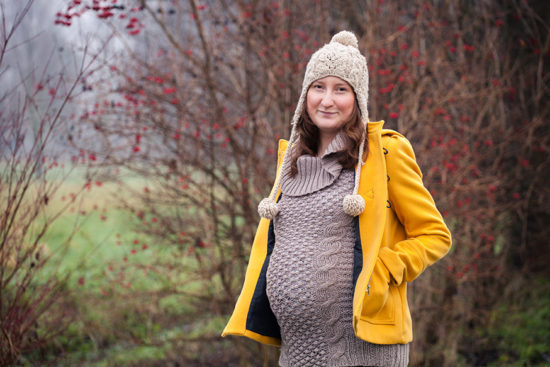Now that winter is here, we share our tips for getting through the colder months while you’re pregnant, from keeping warm to staying healthy.

As your bump grows and the weather gets colder, you might be wondering how best to stay warm this winter.

A good starting point is to look through your wardrobe (or your partner’s wardrobe!) for any cardigans or oversized sweaters that will still fit, along with old stretchy dresses you can wear with maternity tights or leggings.
Layers are a good idea in pregnancy as many mums-to-be say they fluctuate between being too hot or too cold. Also, look out for long stretchy vests in places like supermarkets and buy them in a larger size.
It’s easy to add or remove a layer depending on how you feel. Remember wearing a hat helps keep warmth in and your head is part of the body that shouldn’t change size or shape!
Parent tip
Lindsay Shenton, mum to George and Stanley and member of Northampton NCT branch, says: ‘I made my coat last by putting hair bands through the button holes and looping the other end through the buttons!
I wore a pashmina over the gap. It saved buying an expensive coat.’
You don’t have to opt for new maternity wear which can put a strain on your bank balance.
Look on eBay for pre-worn clothes, check out your local NCT Nearly New Sale, or you could discuss swapping or passing on maternity clothes between friends.
If you’re thinking about the depths of winter and what to do about a coat, you could look in your local charity shops for a wrap style coat in a larger size.
If you decide to buy a maternity coat but are worried about the cost, consider whether it could be altered afterwards to fit when you no longer have a bump.
Thais Ortiz, mum to Logan and Calista, and volunteer with Leighton Buzzard NCT branch, says: ‘My tip is to get a babywearing coat you can use while you’re pregnant and wearing baby in a sling.’

She adds: ‘You can also remove panels and wear it with no bump or baby. There are a few brands available and I get so many compliments when I wear mine with people saying what a fab idea!’
Your centre of gravity shifts in pregnancy, meaning you could be prone to falling especially with the added hindrance of slippery pavements. Flat boots with a good grip on the bottom are a good investment in pregnancy.
Take your time when you’re walking and, if you do fall, get checked by your doctor or midwife. But try not to worry too much as your baby is well cushioned.
A healthy diet is important to get the right balance of nutrients for you and baby – and to keep your immune system strong so you don’t succumb to winter bugs.

In the winter, many of us find we’re not getting enough sunlight. The Department of Health advises all adults, including pregnant and breastfeeding women, to consider taking a supplement of 10 micrograms of vitamin D a day.
It’s also important to stay hydrated, especially if you’re loaded with layers and putting the heating on full blast. You will need to drink at least 1.6 litres of water a day.
It’s recommended all pregnant women have the free flu vaccination and the whooping cough vaccination between 16 and 32 weeks of pregnancy.
You may also feel like hot drinks, so think about decaffeinated tea and coffee as pregnant women are advised to limit caffeine to no more than 200mg a day. Hot chocolate, herbal teas or warm lemon drinks are good alternatives.
Make sure you wash your hands regularly as this is the best way to avoid picking up a bug, especially after travel on public transport or when you’ve got toddlers around.
Many pregnant women also (politely) keep their distance from people with coughs or colds.

It can be harder for pregnant women to exercise in winter, especially with dark evenings and icy weather. Think about indoor activities like swimming, yoga or pilates.
Do tell the instructor you’re pregnant so they can make sure the exercise is suitable, or join a prenatal exercise class where you might also make some new friends.
A cough, cold or flu at any time can be miserable, but it can be more challenging in pregnancy as many women aren’t sure if medications are safe to take.

The NHS says it’s best to avoid taking medicines altogether when you’re pregnant, particularly during the first three months. But, if you are really struggling, check with your doctor, midwife, pharmacist or by calling the NHS on 111.
Paracetamol is usually safe to take for fever or pain at the lowest effective dose for the shortest possible time.
Tablets that have combined paracetamol and caffeine are not recommended.
Pregnant women are generally advised to avoid taking ibuprofen, especially if you’re 30 or more weeks pregnant (unless it’s on the advice of a doctor) as it’s associated with an increased risk of complications.
Watch out for cold and flu remedies as these often also have decongestant ingredients which aren’t recommended.
Flu can be dangerous for pregnant women and symptoms include aching muscles, joint pain, diarrhoea, vomiting, loss of appetite, shortness of breath, headaches, runny nose, sore throat, tiredness or cough.
If you have a blocked or runny nose that’s really bothering you, you could try a warm drink of honey and lemon.
Sitting with your head over a bowl of hot water can help as the steam can clear your nasal tubes. For a sore throat, gargle with warm salt water.
Cold flannels may help lower your temperature, or you may want to use a hot water bottle if you’re shivery. Get plenty of rest and fluids.
Pregnant women may also be susceptible to the winter vomiting bug or norovirus and, like flu, symptoms include nausea, vomiting, upset stomach, fever, headache, stomach cramps and aching limbs.
One mum says she suffered with norovirus when she was 10-weeks pregnant. ‘While it was worrying and really awful on top of morning sickness, I tried to reassure myself that it wouldn’t cause any harm to our baby. I tried to have sips of water, energy drinks and smoothies to stay hydrated.’
Take care of yourself. Take time off work if you need to and get as much sleep as you can to help you recover
Noroviruses do not directly affect your unborn baby but diarrhoea may cause dehydration.
If you’re experiencing symptoms, call your GP and tell them you’re pregnant. They will advise you what action to take. Don’t visit your GP unless advised to do so as it’s important not to spread norovirus, especially to the elderly.
Unfortunately when you’re pregnant your immune system might not be quite what it was before, so you may feel like you’ve been hit harder or that a bug lasts longer than usual.
If you’re worried an illness is lingering, speak to a medical professional so they can make sure it isn’t turning into a chest infection or pneumonia.
Your skin can change a lot when you’re pregnant because of your hormones, so some women find they have spots, while others have dry skin.

The latter can be exacerbated when you’re switching between chilly winter air and warm central heating.
Try to use moisturiser morning and evening. Chapped lips can also be a problem in winter, so remember to use lip balm.
Lots of mums-to-be find they have an itchy tummy as the skin stretches to accommodate their growing baby and this can be heightened in the winter months when skin is dry.
Pregnant women should avoid hot tubs, jacuzzis and saunas, as they can raise your body temperature dangerously high in just 10 minutes.
A moisturiser can help and it doesn’t need to be an expensive pregnancy brand – the basic ones do the same job. You could also try a skincare oil which can help with stretch marks, as well as dehydrated skin. Drinking lots of water helps too.
A pampering bath might be just what you want after a day out in the cold, but try not to make it too hot (stay below 100°F) because it could push up your core body temperature and this could be harmful for your baby.
Don’t worry though, as you’re not likely to overheat in a bathtub, since the water cools over time and your upper body is actually out of the water.
Try to enjoy the season as much as you can. And don’t forget winter is actually the perfect excuse to stay indoors without feeling guilty – snuggle up with a blanket, relax with a hot chocolate and look after of yourself!
NCT information on infections in pregnancy
NCT information on flu in pregnancy
NHS information on medication in pregnancy
Best Use of Medicines in Pregnancy (bump)
Public Health England information on the flu vaccine
NCT information on itching in pregnancy
NCT Nearly New Sales